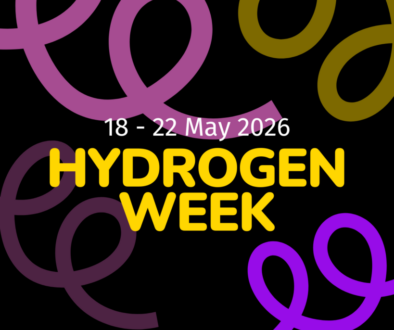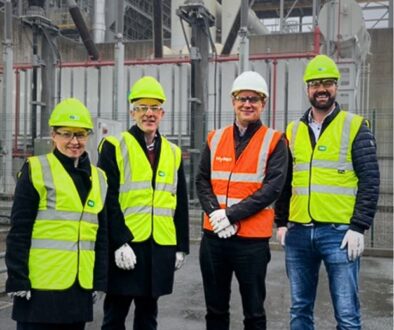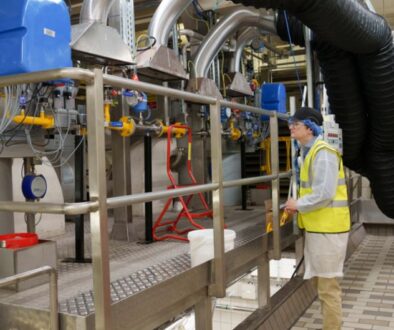South Derbyshire District Council trials Hydrogen RCVs
Following a funding bid, South Derbyshire District Council (SDDC) has been awarded a grant via Innovate UK and Local Enterprise Partnership D2N2 to conduct a six-month trial of two hydrogen dual-fuel refuse vehicles and the supporting temporary refuelling infrastructure.
Converted to run on hydrogen dual fuel, the vehicles can significantly reduce harmful emissions and contribute to a carbon-neutral fleet operation.
The project’s objectives were clear: SDDC has committed to becoming carbon neutral by 2030. Three key areas identified as fundamental to achieving this are renewable energy, transport and buildings.
When considering options for carbon reduction with transport, one challenge became apparent. Although vans and standard vehicles could transition to electric vehicles, South Derbyshire’s rural, elongated operational area means that electric RCVs must be more practical for the Council to operate on its fleet and potentially far too costly to become replacement vehicles.
The Council liaised with Toyota Manufacturing UK at the vehicle manufacturing plant located at Burnaston in Derbyshire to discuss its own journey using hydrogen technology to fuel vehicles. It also engaged with ULEMCo, an expert in Hydrogen Solutions for Transport. ULEMCo is a leading developer of technology that enables commercial vehicles to convert current diesel combustion engines to run on hydrogen—diesel dual fuel.
Through engagement with ULEMCo, the Council recognised The Procurement Partnership Limited (TPPL) as an organisation capable of supporting a unique technical procurement process for converting vehicles to hydrogen hybrid technology and the infrastructure to support them.
‘Our inclusion in the TPPL framework has been really important to our success in supplying hydrogen transport solutions for the public sector,’ said Amanda Lyne, ULEMCo’s Managing Director. ‘TPPL really helps SMEs meet procurement processes and put highly innovative approaches and technology into real-world use.
‘In this case, the two refuse trucks are already in use, saving hundreds of tonnes of GHG emissions. As a trial, this really points the way to helping councils like South Derbyshire deliver on their net zero targets.’
Following a comprehensive process, Fuel Cell Systems was identified as the preferred hydrogen refuelling supplier to support the trial. The plan is to monitor the performance of the vehicles during the trial period both technically and operationally, including assessment of driver use, public perception, and procurement challenges. A ‘playbook’ can be written for other district councils when considering this solution to help them decarbonise.
The grant supported the Council with the cost of the ULEMCo hydrogen dual-fuel conversion works to two new Dennis Eagle refuse vehicles procured before the trial. The grant also supports the additional cost of hydrogen compared with diesel. The trial will run for five months and commenced at the beginning of December 2023. The Council has already realised a 40% reduction in tailpipe emissions and diesel displacement compared with conventionally fuelled versions operating on the fleet.
Whilst deployment of the infrastructure and vehicles provided various challenges due to the new technology involved, the need for handholding and specific operator training was critical and scoped into the procurement specification, supported by TPPL.
Matt Holford, Head of Environmental Services at SDDC, commented: ‘The Council couldn’t have done it without TPPL’s expertise and support in this industry. The support received was fantastic throughout a complex and lengthy process.’
James Brennan, Managing Director of TPPL, commented: ‘We were delighted to be approached by South Derbyshire District Council to support them with this innovative project. Our procurement solutions and services have been developed to support local authorities with decarbonisation initiatives. We hope the output from this trial will help other district councils make an informed evaluation on the viability of hydrogen as a fuel source for their own refuse fleets.’
Fuel Cell Systems Limited and BOC, both appointed to the TPPL and Highland Council hydrogen infrastructure and supply procurement solution, have provided the temporary mobile refuelling solution.
Tom Chicken, CTO of Fuel Cell Systems, commented: ‘Vehicle trials, such as the one at SDDC, are key to demonstrating hydrogen as a practical solution for commercial vehicle fleets. Our hydrogen refuelling products are modular, scalable and affordable, enabling councils across the UK to conduct trials before making a significant investment. The support of TPPL has been invaluable in facilitating this.’
D2N2 is one of 38 Local Enterprise Partnerships working across England to support business growth and increase productivity. Its ambition is to improve the productivity of the Derbyshire economy and the residents’ standard of living in the area.


